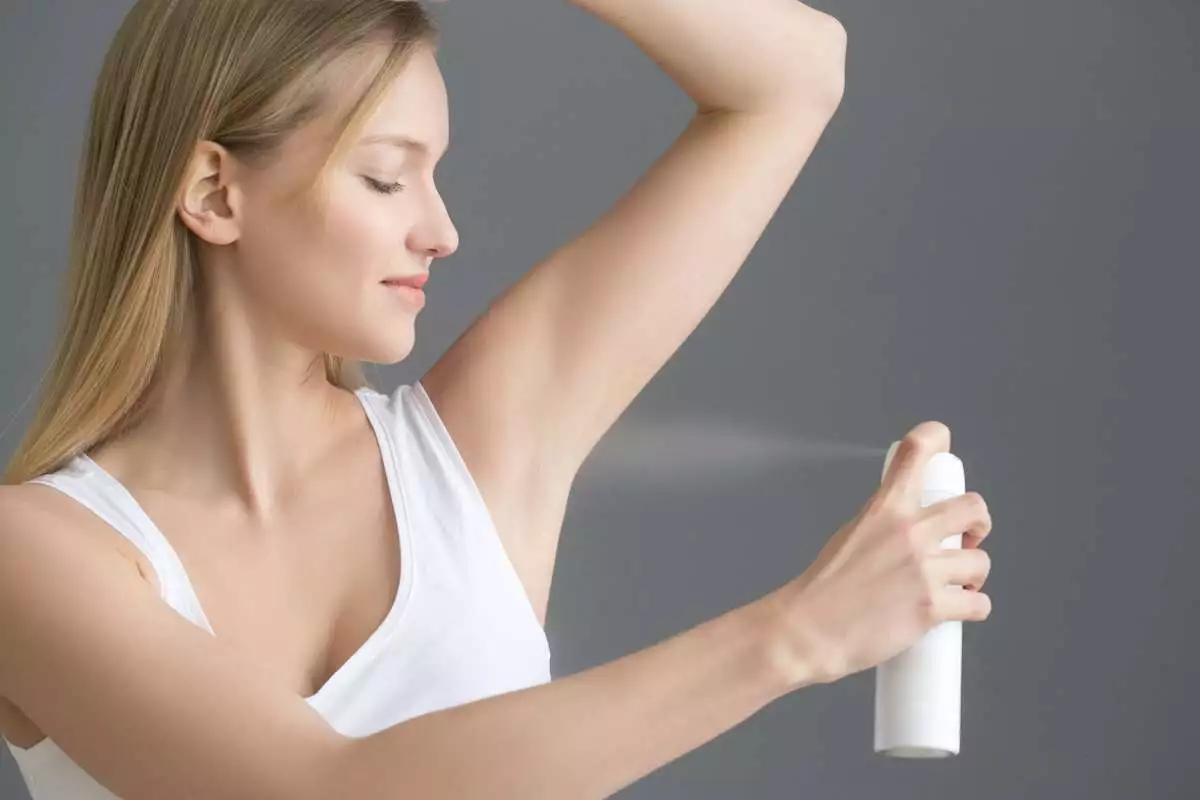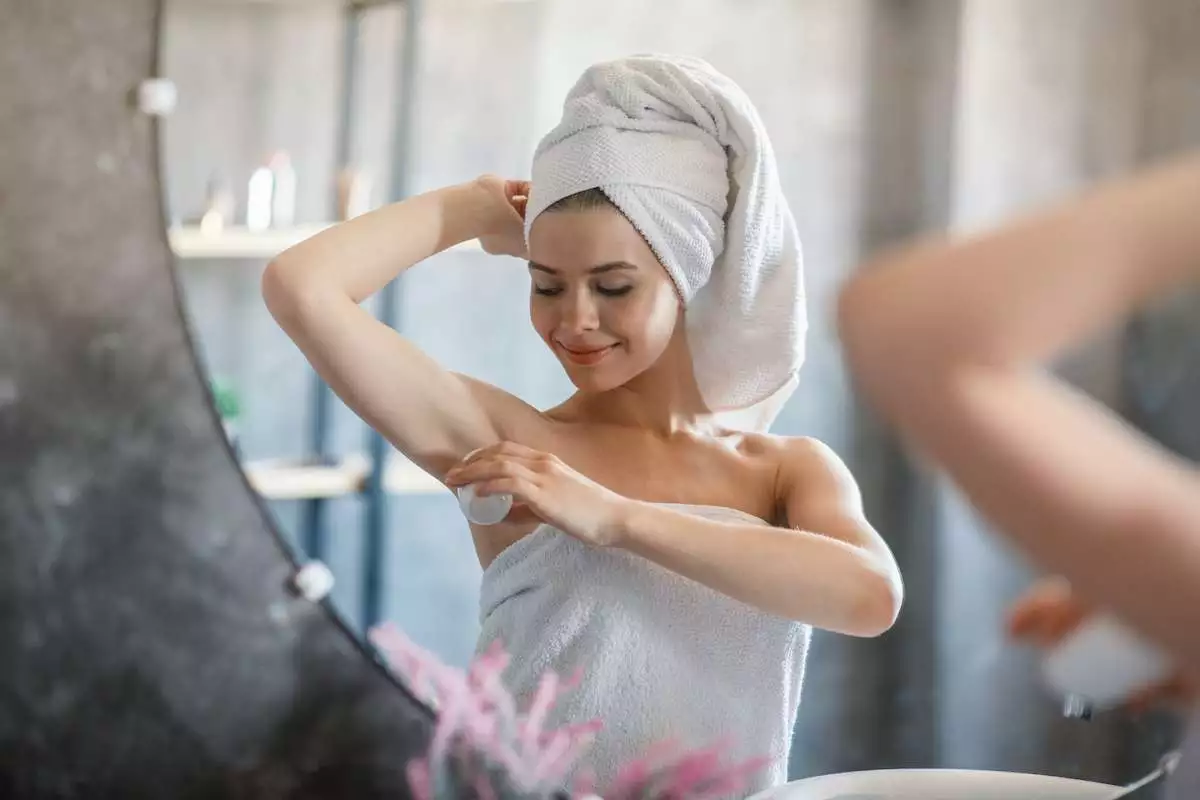What is an Antiperspirant? [And When Should You Use It!]
If you’ve ever had the embarrassing realization that you’ve over-sweated just before a crucial interaction, you know that deodorant doesn’t do much to save the situation. Yes, perfumes can mask the body odor that comes with sweating, but prevention is better than cure.
An Antiperspirant is a chemical agent that reduces perspiration by using metallic salts like aluminum chloride and aluminum chlorohydrate. These salts dissolve into the moisture of the skin surface to form a temporary gel that sits on sweat glands and reduces the amount of sweat released.
In this article, you’ll learn more about antiperspirants and how they operate. You’ll also know when to use it and discover what side effects you must be aware of when using the product and how often you can apply one. Finally, you’ll find out great deodorant options and antiperspirants to make your own!
So, let’s get started, shall we?
Antiperspirants: One Product, Many Forms
It is easy to get confused about what is antiperspirant and what is not!
Not all antiperspirants are made alike. The product comes in roll-on, spray, and powder forms, and different formulas are used for antiperspirants of different strengths. More concentrated solutions are used for the control of excessive sweating. Antiperspirants can also be fragrant and combat body odor by killing the bacteria that cause it.
Difference Between Antiperspirant and Deodorant

People often consider deodorants and antiperspirants the same thing. But, that is not true!
Contrary to common belief, antiperspirants and deodorants are not the same and have a few distinctive differences. Simply speaking, an antiperspirant works towards reducing how much you sweat, whereas a deodorant masks the odor produced by sweat.
Because of their related effects, they are most often mingled into a single product. However, deodorants are considered cosmetic, whereas antiperspirants come under the classification of drugs, because of which they are regulated by the Food and Drug Administration (FDA).
Due to this, not only do they have expiration dates on labels, but they are also subject to different regulatory policies and procedures.
Antiperspirants work by using aluminum-based ingredients to block the eccrine glands, which produce sweat. Deodorants, on the other hand, are known to offer two forms of protection against body odor.
The first works with a reduction in the number of odor-producing bacteria through its antimicrobial properties. The second uses a fragrance to mask the odor being produced.
Deodorant, therefore, doesn’t stop you from sweating as it merely helps cover up the smell that often occurs because of sweating. Antiperspirants, however, use formulas to prevent the production of sweat and, therefore, also the body odor that comes with it.
How Does an Antiperspirant Work?
Antiperspirants work to reduce the amount of sweat produced by our body along with the body odor that comes with it. Although they do not interfere with our body’s natural ability to regulate its temperature, which is also called thermoregulation, they do block the sweat ducts to reduce the amount of sweat reaching the surface of our skin.
If used correctly, antiperspirants form temporary gel-like plugs at the topmost parts of our sweat pores to prevent sweat from reaching the skin. Therefore, although sweat continues to be produced by the sweat glands, it does not reach the surface of the skin.
Aluminum salts are one of the main ingredients in antiperspirants. These salts are soluble in low pH or as long as the formulation is acidic. However, when they come in contact with the skin, the pH rises, which causes the salts to precipitate out and form kind of a temporary plug over the sweat glands, which prevents the transportation of sweat.
Is Antiperspirant Bad For You? What are the Side Effects?
Numerous studies over the last two decades have linked the use of antiperspirants to a number of serious health-related complications, including breast cancer, Alzheimer’s, and dementia. It is important to note that most of these studies hold no scientific validity and are yet to be proved via experimentation.
Refrain from buying into the bulk of misinformation that revolves around the use of antiperspirants and deodorants, as no studies have factually shown their use to be seriously harmful. However, although their use is not life-threatening, there are some side effects that you need to keep in mind.
1. Hormone Disruption
Ingredients like BHTs, parabens, and triclosan are known to interfere with the thyroid and gene functions of the human body. They used to be a constituent of a number of antiperspirant brands and have now been discontinued by many because of their hormone-disrupting qualities. However, some brands still include them and therefore can cause such complications.
2. Allergic Reactions
Allergic reactions are undoubtedly the most common side effect of antiperspirants. Irritation, redness, or itching sensations can be caused by formulas with artificial ingredients and dyes. They affect different individuals differently. Therefore it is essential to test the product on a small portion of your skin before applying it to a larger region.
3. Changes In The Armpit Microbiome
Although a great deal of research is required in this scope of the study, recent research suggests that antiperspirants do affect the type of bacteria that live in our armpits. But we do not know more about its repercussions as further research is underway.
What Are the Effects of Blocking Sweat Glands?
Studies carried out regarding the harmful effects of using antiperspirants have failed to find a statistically and factually significant connection between blocking sweat glands and harmful repercussions. Therefore, the use of antiperspirants is relatively safe.
Still, an antiperspirant must be used according to the directions mentioned on the label. Using it twice a week is considered a safe practice as its effects are usually strong enough to last more than 48 hours. Because antiperspirants are strong repellents, it is quite possible for your skin not to absorb them on a day-to-day basis because of the residue remaining from the previous applications.
When Should You Use an Antiperspirant?

You should use an antiperspirant when you expect yourself to sweat a lot. For instance, use it before a gym session or perhaps before an event that usually makes you nervous such as a job interview, or a public speaking event. For best results, use the antiperspirant after a shower on dry skin.
Antiperspirants only work the best when they are applied to dry, clean skin. That is why it is advisable to use them after taking a shower. You can inculcate its use in your nighttime skincare routine after taking a cool shower at bedtime.
Because sweating during sleep time is limited, the active ingredients in your antiperspirant are more likely to get absorbed into your sweat glands during that time. You can wash it off in the morning or even reapply a little layer.
High concentration antiperspirants commonly prove more effective than low concentration or aluminum-free preparations. However, it is essential to note that an increase in potential side effects comes hand in hand with an increase in the strength of antiperspirants.
In cases of excessive sweating, use the product on a regular basis according to the directions of your doctor and gradually reduce it once you start seeing an improvement in your condition. Initially, you may need to use it for 7 to 10 nights in a row, after which you can bring it down to every other night for one week. The need for reapplication would also dwindle with time.
Can You Use an Antiperspirant on Your Face?
Contrary to popular belief, Antiperspirants can be used anywhere on the body where sweating may be a problem. Antiperspirants can be used on hands, feet, face, back, chest, and even groin. However, different areas of the body may require different concentrations of the product.
Since antiperspirants are the first line of treatment for excessive sweating, they can be used anywhere on the body where sweating may be a problem.
It is usual for antiperspirants containing aluminum chloride hexahydrate to contain concentrations of 10% to 15% of this metallic salt, which is recommended for excessive sweating of the underarms. However, a considerably higher concentration- usually around 30% or more- is recommended for the hands or feet.
Because irritation and skin allergies are common side effects of antiperspirants, it is essential to consult with a healthcare provider before using them on sensitive areas such as your face, back, or groin.
This way, you can get insightful information about the kind of antiperspirants and active ingredients that would be suitable for you. If you suffer from excessive sweating on your face, you can try applying a soft solid formulation along your hairline for best results. Make sure to test the product on a small portion of your skin before use.
Which is Better – Deodorant or Antiperspirant?

Both deodorants and antiperspirants work to control sweat and odor in their own respective ways. However, you can get a better insight into which option may be a better fit for you by looking into the advantages of both of them.
Sweating is a natural phenomenon that none of us can control, and so is nothing to be embarrassed about. However, the odor that comes with it may cause an unpleasant situation, and that is where deodorants come into play.
Not only do they hold the potential of masking this odor, but they also make you smell considerably better because of the fragrance that makes up a significant part of their makeup. Because of this, you can work out at the gym or participate in a family get-together confidently by smelling just the way you want to.
Antiperspirants, on the other hand, boast the added benefit of acting as a deodorant along with their own function, which is preventing sweating. Antiperspirants block the sweat glands, thereby effectively preventing sweating, which also reduces the bad odor that comes with sweat. Therefore, if you suffer from excessive sweating and want that to change, antiperspirants may be the best fit for you.
It is significant to note that the benefits that come with these products are temporary, as the ability of sweat glands to produce sweat is restored once the antiperspirants are removed.
Best Deodorants + Antiperspirant:
Here are the three best deodorants that are both antiperspirant and Fragrant.
1. DOVE Advanced Care Antiperspirant Deodorant
The Dove Advanced Care Antiperspirant Deodorant is a comparatively softer antiperspirant deodorant specifically designed for women with sensitive skin.
It includes Aluminium Zirconium Tetrachlorohydrex GLY (15.2%) as its active ingredient, and because it does not have potentially harsh active ingredients, it is a great fit for individuals who do not necessarily need clinical-strength formulations.
2. SweatBlock Deodorant Plus Antiperspirant
SweatBlock Deodorant plus Antiperspirant is a motion-activated product with regular strength and works great for sweat and odor control. It provides protection from sweat and body odor for a period of 24 hours after its application and is therefore not too harsh.
It contains Aluminum Zirconium Tetrachlorohydrex GLY (15.2%) as its active ingredient and can be conveniently found on Amazon.
3. DEGREE Advanced Protection Antiperspirant Deodorant
DEGREE Advanced Protection Antiperspirant Deodorant is another of the widely popular deodorants with the power of Sweat-blocking.
This brand offers a wide variety of strong body-responsive products for both men and women. It contains Aluminium Zirconium Tetrachlorohydrex GLY (18.2%) as its active ingredient and provides 24 hours of sweat and odor protection.
Best Antiperspirant For Occasional Use:
1. LA ROCHE-POSAY 24HR PHYSIOLOGICAL DEODORANT
La Roche-Posay 24HR Psychological Deodorant is favored by clinicians and pharmacies alike because of the company’s approach to highly effective, results-driven skincare.
With its minimalist hypoallergenic formula, this product is designed specifically for sensitive or reactive skin that is prone to dryness, redness, itching, and burning. It is infused with La Roche-Posay’s own soothing thermal spring water, which leaves no room for residue or streaks on clothes.



![How to Smell a Perfume Properly? [To Test a Fragrance!]](https://styleuphq.com/wp-content/uploads/2021/09/happy-woman-testing-perfumes-in-shop-6S5TPBD-optimized-1200x800.jpeg)
![Does Perfume Stain Clothes? [With TIPS to AVOID Stains!]](https://styleuphq.com/wp-content/uploads/2021/03/laura-chouette-PBFEDEAkp9M-unsplash-Potrait-light-1075x800.jpeg)
![Is Watch a Good Gift? [Are There Any Superstitions?]](https://styleuphq.com/wp-content/uploads/2022/03/pexels-porapak-apichodilok-360624-1140x800.jpg)

![Does Apple Watch Need a Data Plan? [Complete Guide!]](https://styleuphq.com/wp-content/uploads/2022/03/pexels-torsten-dettlaff-437037-1200x800.jpg)
![Does Apple Watch Have a Speaker? [And, What to Do With It!]](https://styleuphq.com/wp-content/uploads/2022/07/image-of-adult-sportswoman-using-smartwatch-while-2022-02-02-03-59-46-utc-1200x800.webp)